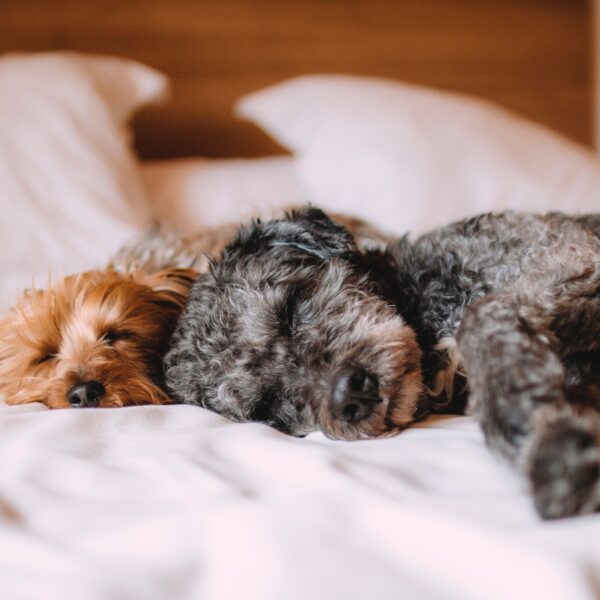So, weeks of anticipation and the day has finally come! You’ve collected your pup from the breeder and arrived home, and now the fun really begins! Amidst all the excitement it’s important to remember what an unsettling day it is for your new four-legged friend, but with a calm and reassuring approach, you can ensure that the first few days in their new home set them up for a lifetime of fun.
How many hours do puppies sleep at night?
It’s tiring work being a puppy – not only are they bursting with energy, but every day is a school day and all that learning is exhausting! Believe it or not, puppies can sleep for up to twenty hours out of twenty-four, broken up into a longer period of sleep overnight (at least that’s the idea!) and several shorter naps. By the age of three to four months old, most puppies will have a six- to eight-hour night-time sleep. Routine is super important and remember if your pup has a long eight-hour snooze during daylight hours, they won’t want to nap when you do!

Puppies first night home
If you speak to many puppy owners, they may draw comparisons to the sleep deprivation that we expect with a newborn human. Puppies crying at night is something that we want to avoid so here are our top tips for a restful first night home:
1. Choose a suitable place for their bed
Where your pup sleeps in the long term is very much a matter of personal choice – you may love the idea of a waggy-tailed canine hot water bottle, or maybe a snug cubby hole under the stairs seems like the perfect bedroom for your pooch. Whatever your views, having them close to you for the first few nights, either on a dog bed or in a crate, will help them feel safe and reassured. It may also help with toilet training because you are close at hand when they ‘tell’ you that they need to go.
Once they are happy and used to their surroundings, you can gradually move their sleeping quarters to your preferred location. Move it just a small distance each night and your pooch will get used to sleeping apart from you at a pace that is unlikely to cause anxiety.
If you already have an older dog in the house, it may be that your pup will be reassured by their presence and happy for their canine companion to provide comfort. Make sure that they aren’t pestering your older pooch too much though!
2. Start a bedtime routine
Not quite bath and bedtime stories but the puppy equivalent! An hour to wind down before bedtime is about right and take them out for a final toilet trip just before ‘lights out’. Settle them in their bed in a calm, reassuring manner with the minimum of fuss.
3. Leave the radio on
Switching the radio on at a low volume can be soothing for an uncertain pup. It can also help to block out any unusual noises in the night!
4. Doggy pheromones
Calming collars and diffusers mimic the natural pheromones produced by nursing mums and can help pups adjust to their new surroundings.
What to do when puppies cry at night
When puppies cry at night it can be stressful for all members of the household. You may wonder if you should leave your puppy to cry or if you should go and check on them. Experts now believe that leaving puppies crying at night can be harmful in the long term and may lead to a lifetime of separation anxiety issues. It’s important to get the balance right though; you don’t want to give your pooch the idea that night time means play time.
Puppies cry for all sorts of reasons, but the commonest reason for puppies crying at night is that they need to go to the toilet. Calmly take them outside to give them the opportunity to relieve themselves, then return them to their sleeping quarters with the minimal of fuss. Settle them in their bed then return to yours!
How often should puppies pee at night?
All puppies are different and the amount that they need to pee at night can vary considerably. As a rough guide, a three-month-old pup can last four hours without needing to relieve themselves, so you can expect to get up at least once a night. Their bladder control will gradually improve up until six months old when most pups should be able to ‘hold on’ until morning.

What about crate training?
You may not like the idea of putting your puppy in a crate to sleep, but did you know that most dogs love the safe space that their crate provides? Think of it like a small doggy bedroom – their own place that they can take themselves off to when they feel the need to put their paws up.
The key to avoiding puppies crying at night in a crate is to introduce them to it in the right way. Here are our top crate tips!
- Never use the crate as punishment
- Introduce your pup to it during the day
- Leave the crate door open to start with
- Put their bed in the crate with a familiar toy
- Offer a small treat when they settle in their bed
- Keep it as your dog’s space – no humans allowed!
For more information, read this helpful article which covers crate training in more detail. Follow these guidelines and puppies crying in crates should not be something that you have to contend with!
Got a new adorable addition to the family? We’d love to see pics on our Facebook page!


